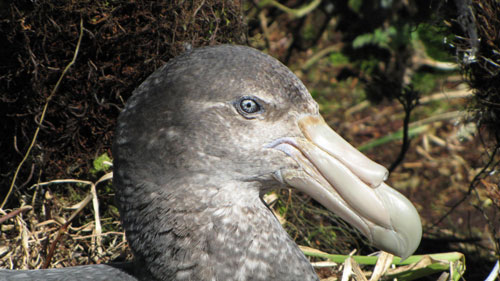John van den Hoff (Australian Antarctic Division) has looked at where juvenile giant petrels Macronectes spp. go to at sea utilizing band recoveries, publishing his findings last month in the open-access journal Ecosphere.
The paper's abstract follows:
"Explaining long-term population change for migratory seabirds such as Giant Petrels (Macronectes spp.) has proven elusive because only aspects of adult life-histories have been studied. There is a paucity of demographic data for juveniles however; there is a considerable amount of leg-band recovery location data for younger age-classes. Nestlings were leg-banded at two sub-Antarctic islands, and at two higher latitude Antarctic breeding colonies. Bands were most often recovered in winter within six months of liberation. Banded fledglings were recovered in known productive upwelling biomes. The birds had travelled between 350 and 6150 km downwind from their natal colonies to reach these biomes. The distances fledglings travelled to reach the biomes were correlated with the observed population trends at their natal colonies; negative/positive population trends were correlated with great/lesser distances travelled. This study highlights the potential importance [of] juvenile life-history attributes when considering population change for long-lived seabird species, and identifies rich upwelling regions such as the Humboldt and Benguelen [sic] Currents that might be important foraging areas for this and other Procellariiform species with high conservation values."
Reference:
van den Hoff, J. 2011. Recoveries of juvenile Giant Petrels in regions of ocean productivity: potential implications for population change. Ecosphere 2(7): 1-13.

John Cooper, ACAP Information Officer, 21 August 2011

 English
English  Français
Français  Español
Español